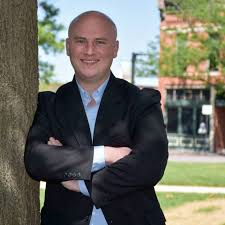Good day everyone:
Hope you have power to see this post today. We don’t have electricity, which means we have left our powerless headquarters in the comforts of the family den (and dogs) to put together this week’s roundup of news you may have missed but need to know.
But first, a quick rundown of some of what we published throughout the week that might have gotten lost in the flurry of a busy news week:
Equality Kansas plans to try to reverse the state’s ban on allowing transgender people to amend their birth certificates. Tariff money is flowing into Kansas, but is it really helping? Senate President Susan Wagle is considering a run for the Senate. Kris Kobach’s gubernatorial campaign ended 2018 in the hole. And there was Treasurer Jake LaTurner’s announcement for the U.S. Senate.
Blocking constituents on social media
Let’s be honest, social media can be a very uncomfortable place. Many days, it’s not a very happy place, with folks mercilessly chewing each other up in front of a sometimes massive audience. But if you’re a politician, you may just have to grin and bear it.
A federal appeals court last week said a county official in Virginia couldn’t block a critic on Facebook because it violated the citizen’s First Amendment rights.
The 4th U.S. Circuit Court of Appeals found that the interactive component of the official’s Facebook page constituted a public forum, and that the official “engaged in unconstitutional viewpoint discrimination” when she banned the critic from the social media platform.
The first person you think this might affect would be the president. But there’s been a lot of grumbling in Kansas political circles from constituents who’ve complained about being blocked by various state officials. Well, those folks might have some recourse.
Here’s various coverage of the court’s decision from the San Jose Mercury News, The Washington Post via the Richmond Times-Dispatch and The Hill.
Here’s a pretty good overall summary of the case and the issues involved from WaPo via the Arkansas Democrat Gazette.
And for those who want to dig even deeper, here’s a copy of the appeals court ruling plus the initial federal court ruling in the case.
Voting site breakthrough
The Hutchinson News on Sunday morning is reporting that there appears to be a resolution at hand in the dispute over Dodge City’s polling locations.
The paper says that Ford County is expected to announce two new polling locations that will be used in Dodge City for the August primary and the November general elections later this year. 
Worth noting that the Western State Bank Expo Center outside of town is not one of the locations, the newspaper reports.
The Hutch News reports that the county expects to contract with the new sites within the next month and will notify voters of their new polling location.
Of course, Ford County made national news last year when it decided to move Dodge City’s lone polling location to the outskirts of town where critics said it was not easily accessible.
The American Civil Liberties Union brought a lawsuit seeking to force Ford County to open a second voting location. The ACLU lost a bid to force the county to open a second site for last fall’s general election, but the lawsuit continues in federal court.
It was recently reported that Ford County had spent about $70,000 defending itself against the lawsuit brought by the ACLU.
Session overview
The Associated Press’ John Hanna looks at the major issues confronting Democratic Gov.-elect Laura Kelly and the newly-elected Kansas Legislature, which will be more conservative than before. Hanna’s story explores the three major issues that will likely dominate the session: school funding, taxes and Medicaid expansion. Worth a read.
Daylight saving time
Republican state Rep. Kristey Williams has introduced a bill that would end daylight saving time in Kansas. It would mean no more worrying about moving your clock forward an hour each March and winding it back again in the fall. Williams argues that it costs the country hundred of millions in lost productivity.
Last year, legislators in 25 states considered at least 40 bills and resolutions dealing with daylight saving time. About half either sought to make daylight saving time permanent or opt out of it altogether, according to the National Conference of State Legislatures.
Six of the 40 bills or resolutions passed, 10 are still pending and the rest failed, according to NCSL.
Hawaii and Arizona (with the exception of the Navajo Nation) do not observe daylight saving time. Arizona hasn’t been springing forward since 1968, when lawmakers there opted out of the Uniform Time Act, which governs time zones and daylight saving time.
Hawaii gave up on the idea in 1967. The state’s proximity to the equator means the sun rises and sets about the same time every day, making DST kind of irrelevant.
Last year, Florida went the other way when the Legislature voted to keep daylight saving time throughout the year. However, Florida is still waiting for approval from Congress to move ahead with a plan that would effectively move the state one hour ahead of the eastern time zone during the winter.
Legislative leadership: A personal look
We all know our legislators by who’s conservative and who’s liberal, who supports tax cuts and who doesn’t, who supports abortion rights and who doesn’t, and who backs Medicaid expansion and who doesn’t.
But there’s a more personal side to lawmakers that can often go underappreciated at the Capitol.
The Topeka Capital-Journal’s Tim Carpenter takes a personal look at legislative leadership, including House Speaker Ron Ryckman Jr.’s baseball card business as a youth, House Majority Leader Dan Hawkins’ love of fishing, Senate Majority Leader Jim Denning’s muscle car hobby, Senate Minority Leader Anthony Hensley’s first House race and Senate President Susan Wagle’s love of the great outdoors.
For staunch partisans, this probably doesn’t matter. But it’s worth a read if for nothing more than to gain some insight about the folks running the show in Topeka.
Rolling in dough — or not
On the surface, a $900 million surplus sounds like a lot of money. However, Republican leadership is arguing that Democratic Gov.-elect Laura Kelly’s campaign promises will eat up that money and more, so they are urging restraint going into the upcoming session.
In a meeting with the Topeka newspaper’s editorial board last week, Senate and House Republican leadership said they think Kelly’s spending priorities — education, transportation, Medicaid expansion, lowering the food sales tax — will leave the state swimming in red ink.
For her part, Kelly has expressed some degree of caution with the budget.
For instance, while Kelly has talked about lowering the state sales tax on food, she has not committed to moving ahead with that until she gets a better fix on the state’s revenue picture.
Robocall legislation
Freshman Republican state Rep. Bill Rhiley of Wellington has filed legislation that would get tough on telemarketers who use misleading practices to get you to answer the phone.
The bill outlaws “spoofing,” where telemarketers make long-distance calls appear as if they orginated locally. Here’s the bill as well as coverage from the Wichita Eagle and The Associated Press.
Goodbye Columbus Day?
Democratic state Reps. Boog Highberger and Ponka-We Victors have introduced legislation replacing Columbus Day with Indigenous Peoples Day.
Columbus Day, created as a national holiday in 1934, is increasingly seen as being outdated and a simplified version of American history. 
Critics have protested the celebration, saying it marks an event that led to the colonization of North America and the start of the international slave trade.
Incoming House Minority Leader Tom Sawyer of Wichita has named Alexa Tapia as his new legislative director.

Tapia has worked as a regional field director for the Kansas Democratic Party and was a regional field coordinator for Democrat James Thompson’s congressional campaign in 2017.
She also managed the unsuccessful state Senate campaign of Democrat Don Shimkus against Republican Sen. Larry Alley of Winfield in 2016.
Tapia has a bachelor’s degree from the University of Kansas, where she majored in global and international studies and women’s gender studies.
“We are glad to have Alexa on board in our office,” said Rep. Sawyer. “Her experience in Kansas politics will transfer well to the work we do here in the Kansas Legislature.”
Davids on government shutdown
Congresswoman Sharice Davids recently gave this interview to NPR about the government shutdown and how it’s affecting Native Americans. Davids was one of the first two Native American women elected to Congress last fall.
Moran on government shutdown
U.S. Sen. Jerry Moran discussed the fallout of the government shutdown with various media outlets in the past week. He told the Wichita Eagle that the government closure could affect everything from agriculture to aircraft manufacturers to hospitals. Here’s more about what Moran is saying about the shutdown from KMUW radio, Kansas News Service and The Associated Press.
Thomas update
Incoming Republican state Rep. Adam Thomas, facing a charge of election perjury, won another delay in his case last week. Thomas appeared in Johnson County District Court last Wednesday, when Judge Sara Welch agreed to delay the case until March 6.
Thomas, meanwhile, will be sworn in this week as the new representative from House District 26 despite being charged with election perjury over questions about where he lived when he filed to run for the Kansas House.
The state constitution requires a legislator to be a “qualified elector,” meaning if Thomas is convicted of a felony, he would lose his right to vote and would no longer be qualified to serve in the House.
Meanwhile, Democrats are moving ahead with a contest of Thomas’ election, arguing that he didn’t live in the district when he ran for the seat.
The challenge was brought in Johnson County District Court where a judge will collect testimony, which will be forwarded to the Kansas House to render a judgment.
Thomas’ committee assignments include Federal and State Affairs, Education, and the K-12 Education Budget.
Deadly highways
Kansas New Service reported last week on a study that showed an increase on highway fatalities after the state raised the interstate speed limit in some areas to 75 mph.
The study found that crashes jumped 27 percent while fatal and injury wrecks increased a little more than a third.
It’s very similar to what this reporter found in 2014 while working with for The KC Star when stats revealed that highway deaths soared 54 percent on the seven highways where the speed limit was raised by 5 mph in 2011.
Waiting on abortion case
We wait and we wait and we wait. The Kansas Supreme Court is expected at any time to issue what could be a landmark ruling on whether the state Constitution protects the right to an abortion.
The case was argued in March 2017 and we still don’t know an outcome. A Supreme Court spokeswoman told The Associated Press that it is the court’s goal to rule on 95 percent of its cases within nine months of oral argument.
Here’s The AP’s report on the ongoing abortion case, a very similar story to one the Lawrence Journal-World’s former political reporter Peter Hancock wrote in November 2017, eight months after oral arguments.
Known unknowns
Democratic state Rep. Jerry Stogsdill of Prairie Village recently wrote U.S. Sen. Pat Roberts’ office to find out how many Kansans were affected by the government shutdown.
In short, it’s impossible to know. Why? Because the agency that knows the answer to that question is closed, of course.
“It looks like the agency that would have those specific numbers is unfortunately one of the agencies that is not being funded,” said the response Stogsdill received from one of Roberts’ staff assistants.













